QuestionQUESTION: Hi, my mouse chocolate dosent seem to eat, except when hand fed at the brink of starvation. Twice now ive taken her to the vet because she was cold and unresponsive. The vet says theres nothing physically wrong with her that would cause her to not eat. So im wondering if it could be a mental thing. None of her cagemates have this problem (she lives with two friends(one male, nueterd) and two of her female babies, weened 2 weeks ago). Also there is always dry food available, and perishable treats when im home.
ANSWER: Hi Kate,
It's great that you took her to a vet - that helps rule a few things out. Did he check her stool for potential parasites, and did he give her a physical exam in case there is something else unrelated to her stomach putting her in pain? Mice that are uncomfortable have trouble eating, so it could be a clue that she is in discomfort somehow.
If your vet checked for all of this and said she was in the clear, I would look for things that might stress her mentally. Sometimes mice are bothered by their cagemates and don't feel they have enough privacy or security to eat, so the first thing I would attempt would be to separate her from the others and see how she does on her own. Make sure she has her own hide she can feel is totally secure, and never remove her from it (unless she is ill, obviously). Provide a wide variety of foods in diffrent spots around the cage, and make sure her bottle is functioning correctly (sometimes the sippers stick, and a dehydrated mouse looks just like a starved one very quickly). Also check all around her cage for potential sources of stress - is she in a drafty area? Is the temperature in the room comfortable for her? Is it an especially high traffic area in your home? Are there predators within smelling distance, like cats, rats, or reptiles? Is there a regular light cycle of day and night that stays consistent each day?
If you are worried she will be sad being separated from her friends, you can leave the cage nearby theirs, but if she already isn't eating it is important to try anything you can as quickly as possible.
One other thing I should ask if your vet checked for is dental problems. If she prefers soft foods, she could have pain in her mouth, that might be hard for a vet to look at (tiny mouths!). I would still try all the above suggestions before guessing that she had oral pain, but it might be something to consider if you see your vet again with her.
Please keep me updated, and best of luck with little Chocolate. I hope she starts eating again very soon!
-Tam
---------- FOLLOW-UP ----------
QUESTION: Yes the vet checked her for all those things, and she was given the all clear. I do have a cat which may have been freaking her out although its never been a problem before, some of my mice will actualy cuddle up to her! Il keep her away from the room my mice are in. Il also seperate her from the other girls, ive noticed a little bit on squabbling between them, but i think il leave the boy marzapan with her to start with as they get along great. Also on a side note, im trying to breed long haired mice, would mice with a long haired father bred with another long haired male have a mostly long haired litter?
AnswerThe short answer is that each pup would have a 50% chance of being long or short haired, but the actual number of long haired pups in the litter will depend on chance. Here is how I came up with that, so you can predict outcomes as you breed:
There are a couple of genes that cause long haired traits in mice, but both behave recessively. What this means is that you will need a long haired gene from both parents to see it in the coat, but a mouse can be a carrier of the gene and not express it themselves. I find it useful to make a Punnett Square when figuring out what a match will produce, to see what your odds are. See how to do them here: http://www.wikihow.com/Make-a-Punnett-Square
I am assuming your first generation that had a long haired father had a short haired mom, so unless she was a carrier for the gene (one long haired gene, one short haired that didn't show through), ALL of the first generation would have looked short haired but been hiding away the long hair gene you need. When you mate an offspring to the father, you have half a chance of ending up with a long haired mouse (one recessive from the gene carried by the offspring, one recessive gene from the father), and half a chance of ending up with another carrier (one dominant short hair gene from the offspring, and one hiding away from dad).
These are better odds than if you mated two siblings, which would both only have half a chance of giving the long haired gene you are shooting for, ending up with 25% short haired, 25% long haired, and 50% carriers.
One thing to be aware of, however, is that the more you inbreed to achieve the gene you are trying to get, in this case long haired, the more you will also end up expressing any other recessive genes those mice are carrying. This is how disorders that are usually hidden for generations come up more often in inbred mice. Inbreeding is a valuable tool, but be cautious of overdoing it, and limit your parent-offspring matches as much as you can afford to.
I hope I helped! Please let me know if I can answer anything else.
-Tam

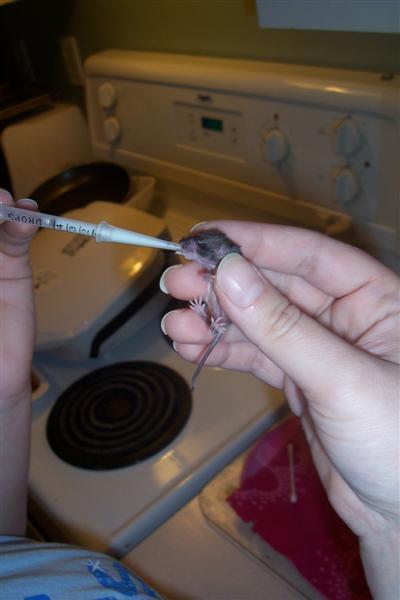 underweight wild baby mouse
Question
baby
a person found a baby mouse in their shed
underweight wild baby mouse
Question
baby
a person found a baby mouse in their shed
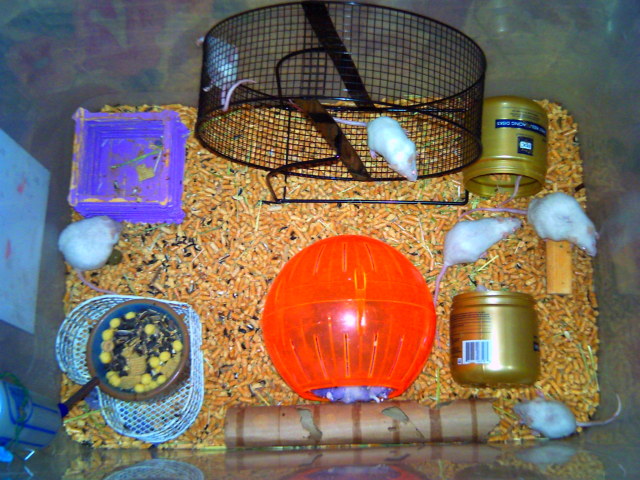 My mouse keeps running in circles... round and round... whats wrong?
Question
9 girls before separat
Hello Natasha,
I own 1
My mouse keeps running in circles... round and round... whats wrong?
Question
9 girls before separat
Hello Natasha,
I own 1
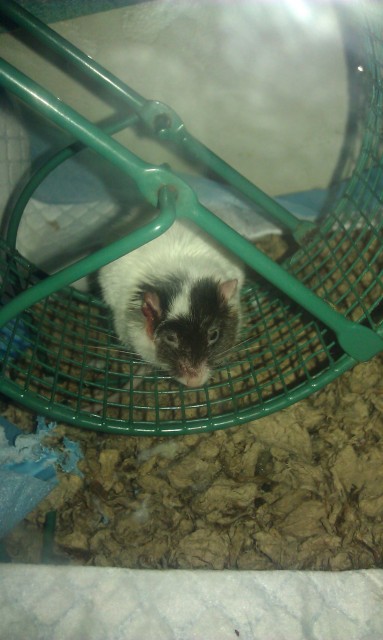 Mouse scratches ear violently: mites, infection, allergies?
Question
oreo
Hello,
I have been reading your
Mouse scratches ear violently: mites, infection, allergies?
Question
oreo
Hello,
I have been reading your
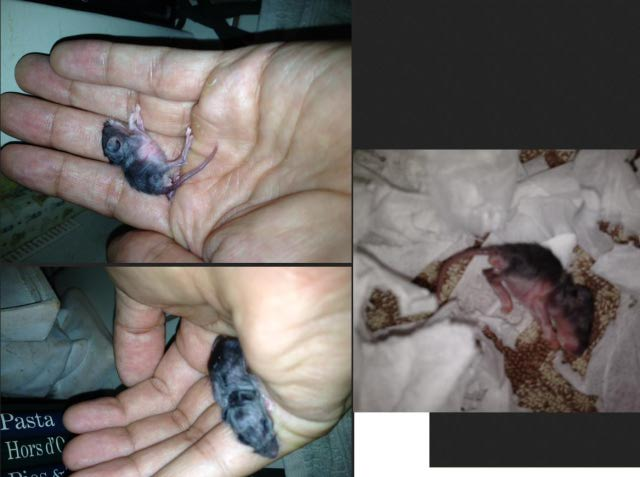 Help! Runt Orphan Not Thriving?rz
Question
Girl Runt
Hi Natasha,
We found two aba
Help! Runt Orphan Not Thriving?rz
Question
Girl Runt
Hi Natasha,
We found two aba
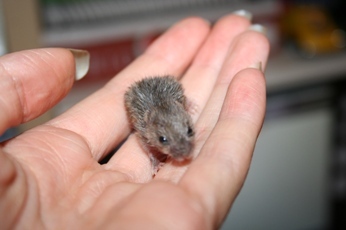 Am I hand-rearing my wild house mouse pup right?
Question
The little Pipsqueak
Hi Tamarah,
About 5 ago
Am I hand-rearing my wild house mouse pup right?
Question
The little Pipsqueak
Hi Tamarah,
About 5 ago